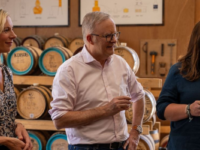Last week, Meta CEO Mark Zuckerberg announced a series of changes to how the company will moderate its social media platforms going forward.
In a statement, Zuckerberg promised simpler and more lenient moderation policies on Meta’s platforms, criticising the existing system as leading to “too many mistakes and too much censorship”. This means that Meta will shut down the existing fact-checking system, remove restrictions on certain controversial topics, and make content filters less strict, among other moves.
Meta’s moderation changes have raised concerns around the world, including in Canberra: Treasurer Jim Chalmers called them “very concerning” in an interview with ABC News Breakfast last week. But how could the new policies actually impact businesses?
Why should small businesses be paying attention?
Many Australian small businesses rely heavily on Meta platforms for marketing, sales, customer engagement, networking, and much more. Aside from opening the doors to less safe online communities and potentially driving users away, Meta’s new policy direction could raise issues around brand safety and reputation.
When X relaxed its moderation policies in April 2023, the platform experienced a 60 per cent decline in US advertising revenue in just three months. One reason for this was an exodus of advertisers due to concerns around brand safety: businesses were unwilling to have their materials appear in conjunction with controversial, political, or offensive content.
ISB spoke to digital marketing professionals who work with small businesses. Shannara Goddard, Marketing and Events Manager at Groei, added that the removal of fact-checkers could make it harder for customers to trust content shared online by businesses.
“The reduction in fact-checking is definitely concerning, especially with the rise of AI-generated content and imagery,” said Goddard. “It makes it harder for people to trust what they’re seeing, and that could become a real issue for businesses trying to build credibility online, especially in an already crowded market place and crowded platform like social media.”
Should Australian small businesses be worried about the potential consequences of the Meta moderation changes and the impact they could have on business?
Should SMEs be worried?
Of all the marketing professionals ISB spoke to, none were particularly concerned about about the impact of Meta’s moderation changes on their small business clients – though they were closely monitoring the developments.
“Meta remains a powerful advertising platform,” said Ben Willee, General Manager and Media Director at Spinach advertising agency. “At the end of the day, this policy change might save Meta a few bucks, but let’s be honest – fact-checkers were never stopping dubious posts from Auntie Doris or some guy named ‘CryptoKing42,’ and this shift won’t change much.”
Jason Le, founder of the digital marketing agency JRNY Digital, shared a similar sentiment.
“I believe it’s unlikely to have a major negative impact on small businesses overall,” said the marketer. “It’s also worth noting that X’s ad revenue decline post-policy changes isn’t a perfect comparison. Elon Musk’s leadership style and the platform’s shifting reputation are likely key factors in that outcome. Meta, on the other hand, has a more established and diverse ecosystem, which is less reliant on any one individual’s influence.”
Le also noted Meta’s history of adapting to policy changes to maintain its position in the advertising landscape.
“Following the iOS 14.5 update and its impact on data targeting, many predicted Meta’s decline,” he said. “However, Meta adapted, and advertisers continued to achieve strong results over time.”
As a result, Le’s business isn’t making any significant pivots based on the new policy changes.
Shannara Goddard said that her business is watching how the changes play out.
“We’re watching how these changes play out and how they impact conversions,” she said. “If things shift too much or trust in the platform drops, we’ll definitely look at other advertising options or strategies that are more reliable.”
In sum, a ‘wait-and-see’ approach is probably the best course of action for small-business owners right now.
Small-business owner Viktoriia Karakulova says she is following this course of action.
“If I find that ad placements negatively impact my brand or reduce ad effectiveness, I’d likely adjust my strategy,” said the founder of Two Cubs. “This could involve shifting focus to platforms like TikTok or Pinterest and collaborating exclusively with trusted influencers and creators to maintain brand alignment and reach.”













